|
|
HOME
- TABLE OF CONTENTS
- WAR ROOM -
THE GOSPEL
- BIBLE
STUDY - MORAL
ISSUES - KING
JAMES BIBLE - CULTS |
Including Mission Headquarters Facilities
There is a sub-cultural special world called the missionary guest house, and it is often located in the same compound as the mission headquarters. These places have a mystique all of their own, and non-missionaries seldom experience this world. The missionary guest house in the "homeland" is there for the missionary to stop over on his way back to his homeland for furlough. The missionary guest house on the missionfield is there for the missionary who lives deep in isolated territory. He needs a place to stay when he goes to the central city to do his annual shopping. Non-missionary guests are almost always welcome in missionary guest houses, but you will pay a bit more than a missionary for a room. Almost all guest houses provide meals in the price, but you may have to eat family style. Conditions and cleanness are almost always higher in these places than in local hotels and lodges. A very smart choice when traveling overseas is to stay in a missionary guest house or hostel. You always save money, and you meet Christian servants who have fascinating tales to tell. The guest house caretakers are also very helpful to steer you around the dangerous parts of the city, and they can tell you how to do a DIY safari at a bargain price. There are also guest houses around the USA where Christian servants are welcome and given preferential treatment. SEE HERE The missionary is living in a lonely place where he is delighted with the fellowship with national Christians, but he longs for those gatherings of fellow missionaries where he can let his hair down, and where he can get with other folks from his home culture and let his hair down a bit. This article will be based on my experiences, over my whole lifetime, in missionary guest homes and hostels.
In 1954 the headquarters of the African Inland Mission was at 253 Henry Street in Brooklyn, New York. The building, which you see to the right, was a sort of funky Brownstone style in basic red brick. In 1954 it looked clunky and quaint to my family because we had just come from California where such buildings did not exist. From the recent photo you can see that there is not much you can do to make an old Brownstone look happy and cheerful. So, New York City was intimidating to say the least. But, it was also an exceptional adventure. But, why a guest house? The first answer is obvious. Missionaries are traveling back and forth to Africa, and they have to stop over in large cities. In the early days of missions, NYC or London were where almost all missions had their headquarters. Passports and visas were easy to get there, and missionaries could easily get vaccinations and treatment from doctors in the city. Every mission had a designated doctor who usually gave appointments at reduced rates or free as a way to help missions. But, the guest house was important for another reason. Big cities, whether you love them or hate them, wear you down pretty quickly, and you end up looking forward, at the end of the day of business and shopping, to the "sitting room" of the mission headquarters where you could sit back, read a book, and coast mentally. I will now give you a review of some of the things about NYC which wear you out, even if you like the city. I am including my impressions of New York City because it was quite different in 1954 than it is today, and my friends who read here will want to reminisce and compare my experiences with theirs. Also, my later visit in 1959, and even later with my wife as we were on our way to Ethiopia, are included.
Subways- Before I spent that first six weeks in NYC at age ten, I had never ridden a train before, let alone one that dove underground like a mole. I had ridden street cars, but they in no way resemble subways. Just walking down the steps into the heart of the earth was spooky. Then, after pushing through the turn style, I walked into the station area. It was dark and dingy and reeked with the caustic odor of ozone. NYC has never caught on to the notion that subway stations could be ambient or esthetic. To see such a thing, you have to go to London or European nations. Perhaps the most grand subway stations are in Moscow. SEE VIDEO. SEE NYC SUBWAY STATION. One day we had to change trains several times to get to our destination. This left us at the lowest fifth level of the subway system, and it was creepy. Stalactites of fungus were hanging from the ceiling, and water was dripping from them. My Dad, always ready to creep out his boys in some way, declared that was water leaking from the sewer system that ran between the subway tunnels and the street above. I at once learned to walk between the drips. Lurking in the subways are the kindest people in NYC as well as some very sleazy creeps. The gentle souls see you looking at the map of the subway system on the inside of the train, totally confused by the many colored lines you have to transfer among to get anywhere. And, these kind people say, "You must be new to NYC, right? Where are you trying to get to?" You tell them, and they at once figure out the best way to get there. One Jewish lady even plotted our course to the Doctor's office, got off the train at our station, came out above ground, pointed out the street we needed to walk down, and she then went back down into the subway and got back on a train to her own destination. There are good people in NYC, just don't look for them at City Hall. I told you this tale of the subways to show how desperately the newby in NYC needs a place of refuge at the end of the day. This would be the "sitting room" of the guest house. This is called a living room in the USA. The sitting room has two special features- quietness and soft places to rest and read, as well as opportunities to chat with other missionaries. There is always a short-wave radio on hand, and everyone gathers at 9:00 in the evening to listen to the news from the World Service of the BBC. Everyone is interpreting the news in the light of the Gospel and world missions. There is a coup in progress in Angola. Someone says, "Why, that is exactly where the Bill Worthingtons are stationed. We must pray for their safety, and most people scribble a note for their personal prayer directory. LISTEN TO THE BBC WORLD SERVICE LIVE ON THE INTERNET
As a kid, I was enthralled by the street vendors. We were in NYC during the winter, so there were vendors selling hot chestnuts, hot dogs, puffy hot pretzels with mustard, and things I have forgotten. I thought this was a real adventure. The hot pretzels with mustard were more exciting to me than ice cream. The food is reasonably safe because the city regulates the profession rather strictly.
Automats- Automats
are almost exclusively a NYC thing. There might have been some in Philadelphia,
but New York was the only city with automats to my knowledge. An automat is a
restaurant like a cafeteria. But, inside along the back wall are dozens of cubbyholes
that look like the mail boxes in a city post office. Each box has a little window,
and you can peek in and see some sort of food, from meat and potatoes to lemon
meringue pie. You drop your quarter in the slot, and you open the little door
and pull the food out. What you thought you saw through the window was not always
what you got. After you got your New York City automat at the right.
My parents needed to buy all sorts of supplies to take to the missionfield for their work. This meant riding all over NYC on the subway and walking the streets for hours. My Dad loved to visit the Jewish merchants in Manhattan who pulled half their inventory out on tables on the sidewalk. There were blocks of these stores, and I saw things there that were new to me, and I had to ask dozens of questions to learn what they were all used for. Also, there were the chess clubs that I found mysterious. Jews, wearing yarmulkes and long beards, sat in a fog of cigar smoke hunkered over chess boards at small tables. Then, there is the noise in NYC. Cars are honking nonstop, drivers are scolding one another for being cut off, cops are blowing whistles to get people's attention and wave them here or there. There was not much sense to the noise, it was just there in the background, and it was still there at 3 AM in the morning. Again, can you see why the guest house was absolutely essential to survival in the Big Apple?
Sweet Lurking Leilani- She was about sixteen years old, well endowed, gushing with enough self-esteem to terrify even Joel Osteen, and she was determined to introduce me to loose thinking and jazzy ways. Her mother was a widow on her way to Africa to teach at a school. Leilani would corner me, sit me down, and sing love songs to me. She was not in love with me at all. I was way behind her in the social structure since I was just going into fifth grade. But, Sweet Leilani sang popular songs to me to show me how well versed she was in the ways of the world. She gave me the creeps, not because I was such an upstanding saint in the making, but her fluffy and wild manner just seemed totally weird to a ten year old boy. At age ten, I was only willing to make a friend of a girl if she liked to climb trees and had her hair in pig tails. HERE IS THE ACTUAL SONG SHE SANG THE MOST If you actually listened to that, can you visualize a ten year old boy trying to relate to the hubris of the seductive emotions of Hawaii as interpreted by Hollywood? The irony was that it was 1954, and the song was a hit after Bing Crosby sang it in a 1937 movie. The song was definitely not on the hit parade in 1954. But, our Sweet Leilani in Brooklyn was like that. Her notions of being hip and cool were not very up to the moment. Later, Sweet Leilani was in the same boarding school I attended, and as I struggled my way through puberty, I gradually figured out that Sweet Leilani was not struggling at all with puberty..... she was celebrating it and rocking it for all it was worth. But, for six weeks at the Brooklyn guest house I was the only audience Sweet Leilani had, and I had to suffer through many performances of pop songs and rancid tales of love and trendy silliness. Thus, when someone turned on the BBC World Service News Hour at the end of the day, I was happy to listen to Angus McDermit, with his subdued plum-on-you-tongue English, read the news instead of another round of stale pop culture.
Lillian Halstead- Lillian Halstead had been a missionary in the Congo with Africa Inland Mission for many years. She had won the hearts of many savages to Christ, and the Africans loved her for her tender heart and her zeal for the Word of God. Lillian had also translated the New Testament into the Alur language, no small task. Lillian had aged pretty peacefully, but in recent days she had lost a couple marbles, and it was time for her to retire. She was living at the mission headquarters for the time being until a place for her could be found at the mission retirement home in Florida. Lillian did not let the grass grow under her feet. She went forth every day into New York City, and she left Gospel tracts all over the city, especially the subways. Lillian was a strategic thinker. People heading into a subway station would be having time to read while they rode home. Lillian would stagger her tract evangelism. She went out one day at 3:30 PM, the next day at 4:00 PM, the next at 4:30 PM, and so forth in a rotation. This way, she reasoned, she would get to everyone in NYC sooner or later. This might have been a bit overly optimistic, but in spite of her mind being a bit off, she still had a sense of spiritual warfare in her zeal for Christ. Do we, like Lillian Halstead, think strategically about how we go into the world with our Savior? Lillian had another project. She believed that all children should be required to memorize Bible verses. And, Voile, here is a ten year old boy staying at the guest house for six weeks. Lillian got permission from my Dad to help me memorize Bible verses. My Dad totally abandoned me at this point and turned this dear old lady loose on me. Of course, Dad had his reasons. I was bored much of the time, and he figured this plan would keep me out of trouble. After whining about it at first, I soon figured out that the memorizing sessions would deliver me from Sweet Lillian, and that was not all bad. Lillian gave me a red Gospel of John, and inside the back cover she had glued a page of verses she intended to help me memorize. This was totally new to me. To memorize one verse during the week to recite in Sunday School was one thing, but this list of hers was LONG, and I just knew I was not up to the challenge. Furthermore, being young and still mixing my own priorities with those that would honor Christ, I felt like the word "torture" might fit what was coming. So, what did this pious ten year old do? He hid from Lillian. I found spots all throughout the guest house that I thought Lillian could not possibly find, and at the hour designated for a memory session, I hid out, ever so still and quiet. But, alas, Lillian had lived too long in the Congo where finding sinners was the only thing she lived for. And, just when I thought I had fooled her finally, she would pop up, smile like the bearer of joy and delight, and tell me, "It's time for our Bible verse memory time." She never accused me of evading her, and she never got grumpy at my slowness to memorize. She also had the special sense that no one ever got right with God by hammering them with accusations and rebuke. Some of you preachers could look into the techniques of Lillian Halstead when you are railing on sinners during the altar call time. I must confess that I don't remember what verses I memorized during that ordeal, but I am sure most of them stuck because they kept coming up in sermons and Bible class in school, and that reinforced them. But, the one text Lillian loved the most was Psalm 103. THAT one stuck, and for the rest of my life I have resorted to it over and over again when doubts came or the way got rough. How about YOU memorizing those verses. They are easy to learn, and they will stay with you for the rest of your life. Lillian had another trick which she used to keep me trying to learn the verses. She told me stories from her life in the Congo, and I loved them. They often had a moral, and some were scary and creepy. She knew a young boy would love this, and she broke up the memorizing sessions with the stories. Here is just one that I remember: An African man in the Congo had a donkey he used to carry his farm produce to the open air market every Saturday. The donkey was a good animal in most ways, but he had one bad trait. When the African would drive the donkey through the river with a load on him, the donkey, which was hot, would stop in the middle of the river and refuse to go on. The African had to beat and pull on the donkey for some time in order to get him to climb out of the river. So, the African man came up with a plan. He loaded the donkey with a big load of sponges one day and drove him toward the river. The donkey eagerly went into he water and stopped as usual. Finally, the donkey was willing to go on, but he could not get out onto the far bank of the river. The sponges had filled with water, and the sponges weighed hundreds of pounds as they came out of the water. The trick worked. From then on, the donkey would remember the sponge event, and he would rush through the river. Donkeys have one of the best memories of all the animals in the world, so the donkey never forgot his lesson. I wonder if the rest of us Jack asses learn from our experiences as well as that donkey did?
The Kitchen The missionaries staying at the Brooklyn AIM headquarters all cooked their own food in the kitchen in the basement, and then they ate together. This was a great time to hear war stories and hunting stories of missionary life. If you are a Bible believer, and you want to visit a missionfield, be sure to book into a mission guest house or headquarters center. You will get to see missionaries and visit over meals and join in prayer meetings and social activities. The basement kitchen was full of laughter and fun as missionaries told stories from their days in Africa. There were also stories of the strange things that happened as they "went on deputation" to visit churches and tell about their work in Africa. Like the time my Dad was about to preach in a small country church in the South, and the deacon introduced Dad as Reverend Manhattan instead of Van Nattan. As a kid, I was delighted with the blunder and started cracking up, and my Mom jabbed me in the ribs to shut me up. One day we missionary families were all in the basement headquarters building, and every family had their dinner on the tables and were ready to eat. Someone was asked to pray and give thanks for the meal. As soon as the man started praying, Austin Paul started zipping and unzipping his jacket, and it was obvious that his zipping was in time to some hymn, probably Power in the Blood. He did that throughout the whole prayer, and right after the "Amen" he said, "This zipper would make a great instrument for my band." Austin Paul was a missionary to the Congo, and he had taught several Africans to play brass band instruments. He took this team all around Congo, and even to other nations, to play in churches, and they were quite famous. We all roared with laughter at his performance, and I decided brother Paul was a pretty cool man. He had given me comfort for all the times I had been scolded for being noisy during prayer.
The headquarters was only a few blocks from the Hudson River, and overlooking the river was a promenade park where New Yorkers went to walk, smoke cigars, or sit and read. We went down there pretty often during our stay. The photo is of the actual promenade In 1959 when coming back to the USA on furlough, I would walk down there with Dick Weise who was a school mate of mine at Rift Valley Academy back in Kenya. Dick was about three years ahead of me. Dick was a bit crazy and fearless, but he was fun to be with. We were walking back to the mission headquarters from the promenade when a gang of high school aged boys surrounded us at a cross street. I became terrified of course. They all had knives and were tossing them back and forth from hand to hand and mocking us in a very sinister way. Dick went into another mode of reaction. He grabbed his groin and said, "You guys terrify me so much I think I will wet my pants." Dick then roared with laughter and fluently mocked the gang of boys back, making all sorts of references to their heritage. The boys got more vicious and threatened to knife us, and Dick roared like an animal and laughed and laughed at them. The gang all started looking at each other and the leader, and the leader got confused. He was clearly unsure what might happen if he attacked a big kid who just laughed at thugs with knives. The gang threatened us soundly but clearly were losing their way mentally. Dick said, "Come on, Steve. These guys are a bunch of babies," and Dick lead me on down the street. I learned something from Dick about dealing with threats. The next day was Sunday, and my family and the Weise family were all out for a morning walk. And, who came along tagging behind his Mommy but the leader of the gang of boys? He was all dressed up in his Sunday suit with a bow tie. Dick Weise stepped in front of him and said politely , "It is so nice to see you going to Mass this morning." The poor kid shriveled up and pulled his neck all the way down into his collar. His Mom smiled sweetly at Dick for being so nice, not knowing how her sometime gangster baby boy was feeling about that moment. Dick, if you are out there, I learned something important from you that day.
Street Below Our room was right above a busy street. I used to sit at the window and watch all the life roll by below. One day the sirens wailed from a nearby fire station. Down the street came fire engines, and a very long ladder truck came to the intersection below. I realized that the truck could not possibly turn the corner and follow the other trucks. As the ladder truck went around the corner, there was a driver at the back end of the truck trailer, and he had a huge steering wheel. He went crazy turning the wheel one way, and after the trailer got half way around the corner the rear driver went mad turning the steering wheel the opposite direction. The trailer went around the corner with inches to spare but did not crash. I was amazed at how this worked, and I realized the rear driver had to have nerves of steel because he had no choice but to do exactly what he did the right way every time. WATCH AS THE TILER DRIVER MANEUVERS INTERSECTIONS. Notice that he has to steer the opposite direction than normal driving. Well, that is enough about the Africa Inland Mission headquarters and guest house. The culture of these old buildings in New York City and London is gone. All missions have moved their headquarters to more modern cities where life is a lot less fearful. But, the culture of the big city is gone. They are not the same today.
Street vendors were everywhere. They sold ice cream of course, but it was winter, and all sorts of hot food was sold out of stainless steel push carts. There were hot dogs, big hot pretzels with mustard, and roasted chestnuts. I loved the chestnuts and still do. The sad thing is that the gypsy moth infested the USA and killed all the chestnut trees, and now chestnuts are all imported and are very expensive. But, my Dad would splurge and get us something to eat on the street. Fortunately, America is not like some European nations where it is considered uncivilized to eat food as you walk along. New York city is a place of many cultures, so each one has its eating places. You can find any kind of menu from all around the world. But, the most common cultural food places where the pizza parlors. We went to a Sicilian pizza place, and the workers behind the counter were so new in the country that they could not speak English, and they had to have help to make change. THAT is authentic. Supermarkets did not exist in 1954. Corner grocery stores were where New Yorkers bought their food, so they paid quite a bit more for food than people across America living outside of big cities.
FOREIGN MISSIONS CLUB- LONDON
We visited Windsor Castle, and we ate at Lyon's Corner House, the only restaurant in London that made a real American style hamburger. We ate at Ye Olde King's Head Inn in Windsor where the ceiling was so low that I had to duck to avoid hitting the cross members. And, we prowled Piccadilly Circus at night. At the left: Ye Olde King's Head Inn Circa 1500 The guest house was a haven for people with a longing for the old days of foreign missions and colonial ways. The present format is much different. Back in 1959 we ate two meals a day there, breakfast and dinner. The menu still reflected some austerity from WW II, so one evening we had beans on toast for the entrée. The plates were served, and I was designated to carry them to our family's table. Dad said I had a strange look on my face when I saw the beans on toast. Another night we had spaghetti on toast. At the right: International Missions Club
Jeremiah longed for a place to escape from the struggle in his day: Jeremiah 9:2 Oh that I had in the wilderness a lodging place of wayfaring men; that I might leave my people, and go from them! for they be all adulterers, an assembly of treacherous men.
The most exciting visit we made in London was to Madam Touseau's Wax Works. All the famous English public figures were there really looking lifelike, and many American famous people and movie stars were there. But, the best of all was the Chamber of Horrors in the basement. There was Jack the Ripper, Guy Fox, and Dr. Jekyl and Mr. Hyde. What fun.
MWANZA GUEST HOUSE- TANZANIA Mwanza, Tanzania (formerly Tanganyika) was pretty much a typical missionary guest house. But, the atmosphere was more free wheeling and lively than most other guest houses I have seen. That was because Tanzania missionaries were largely living on stations in the bush, and when they came to town to buy supplies, they were lonely for friends of their home culture in the USA or the UK. So, occasional pranks, game nights, and marathon gab sessions were common. Also, Lamaki, the African cook loved to play pranks on the missionaries. Lamaki had a dribble glass that looked like cut glass, but it had a hole in the side just below where your lip would be. When you drank out of it, it would dribble water down you chin. Any new missionary was fair game to Lamaki, and we missionaries loved to see his prank work. One lively character was the vicar of the Anglican Church in Mwanza, Pastor Dawson. He was Australian, and he was an extrovert. He often came to the guest house to seek help with something he was doing. One time he came around and was asking for a "wine machine." His Aussie accent change "weighing" into "wine" of course. So the missionary men started teasing him about starting a winery at the church. We often had parties at a station nearby to which British colonial officials who were born again would be invited. Good food, games, and pranking was the order of the day. One time Pastor Dawson did a monologue on American baseball which was hilarious. He mocked at the players because they always picked up four bats when they were up to bat. He said they swung them around and finally decided to only bat with one. My Dad challenged the British men in the group to a game of baseball. They said they would take him up on it if the American missionary men would play them in a game of cricket. Both games were hilarious of course. Pastor Dawson gave the verdict on Scottish bag pipe music. He said, "You can turn the record over, and when you play the other side it is the same song in reverse." The Mwanza guest house property was covered with mango trees, and there was plenty of shade. The effect was to cool the area, and missionaries from the hot bush looked forward to sitting on the patio and drinking orange soda. On Sunday, there was an English speakers' worship service in a meeting room. Missionaries could sing in English and enjoy a worship service like "back home" in the USA or the UK. After the evening meal, the hired African help cleared the table, and either games were played, or some missionary told hunting stories. These stories were repeated every time the hunter was in town, and some of the long shots got longer every time the story was told. Often, some missionary would relate some spiritual crisis in the national church on his station and ask for advice on what to do about it. Other missionaries told their tales of woe and how they had eventually seen victory, or failure, in dealing with it. Someone might also have a truck that was not running right, and the missionary wanted advice on what to do. Much of the conversation resulted in new needs going on our prayer list. My parents hosted the guest house for a year while the regular host went on furlough. When I was home from school, I delighted in inhaling the culture and hearing all the stories and gossip. At night, my Dad would call me into the dining room, and, just before going to bed, we would eat things that made bad breath so that we could sleep them off, like blue cheese, boiled eggs, and raw onions, along with crackers.
"We interrupt this broadcast with this announcement." "The British embassy is instructing its citizens in the country to prepare to leave the country........." "All British citizens in the country are being instructed to travel to the capital city at once to be evacuated......" I never heard of the Voice of America doing this. We Americans were on our own, so we simply did what the British missionaries were doing. For some reason, the US State Department has a poor attitude when it comes to the safety of Americans. Witness Afghanistan. I gather it has something to do with the British having an enormous Empire, so they took their people's safety more seriously. Also, if British citizens, throughout history, were not well cared for by the Colonial Office, a row would break out in Parliament, and the Prime Minister got a tongue lashing from the opposition for diddling instead of acting at once. In fact, I have read of a number times in British history when the preachers of England would preach fire and thunder to motivate their members to call their Member of Parliament and complain if missionaries in some troubled nation were not being properly cared for by local British officials. I have never seen this in the USA except when President Jimmy Carter hammered the Soviet Union leaders to free Gorgi Vins from prison in the USSR. The Nairobi guest house was like most such mission based retreats. Missionaries in from the bush, or when traveling to and from Kenya, would stay in the guest house. The culture was classically British colonial. Table service at meals included as many as seven pieces of cutlery. Meals were not served family style as Americans might do. African waiters might bring dishes of food, hold them to your left elbow, and you served your plate. Any desert was called "pudding," and when it was really chocolate pudding, it was grainy and shy of much chocolate. This was because mixes were not available, and the African cook had to make it from scratch. Some of the characters who stayed at the guest house seemed to be right out an old British Empire movie. There was a Christian businessman who sold insurance. He was also a guest preacher at times. He had a monocle, and when he was startled, he would raise his eyebrow, and the monocle would drop into his coat pocket. The effect was startling, and us kids loved to see him do it. He and my Dad would argue as to the purity of British and American English. He had a standing arrangement with anyone who knew him. If they caught him in the city smoking a cigarette, the person was to walk up to him and call him a "silly ass." It worked. He stopped smoking. As in all guest houses in the British Empire, the day ended with all the guests gathering in the "sitting room," and the host would turn on the BBC World Service on the short-wave radio, and we all waited for the six beeps on the hour by which a million Englishmen set their watches. Afterward the BBC would give world news, and a lively discussion often followed as the guests discussed what was implied by the news. The host would then read the evening entry of the Daily Light for that day, and he would ask one of the man to pray. It was understood that children would then go to bed, and often a couple of men guests would stay in the "sitting room" and tell hunting stories to one another. Once in a while my Dad would allow me to stay and hear the stories. On these occasions I felt very grown up. If you are traveling through Kenya, and you would like to stay at Mayfield, it is about $48 a night per adult if you are not a missionary. If you are a missionary from any mission, it is nearly half of that. SEE ONLINE
Sudan Interior Mission was started by missionary pioneers to Nigeria in 1895. After the work grew into several West African nations, SIM sent men to Ethiopia to start the work there. The Church which developed over the years has suffered several eras of persecution during which the Church grew enormously. In the capital city of Addis Ababa SIM built a mission headquarters and guest house. This guest house is now a place of retreat for tired missionaries and a place to stay when resupplying. Several mission stations can only be reached by mule, and the annual resupply safari is a major project. The headquarters has a pharmacy where drugs are manufactured for the mission hospitals, a publishing facility to print literature, and a service to send supplies "down country" to missionaries by public transport. So, the guest house is a buzz every day of the year. Christians who go to Ethiopia to visit missionaries they support also stay at the guest house. We were in the city to resupply, and there was a single man visiting from the USA. We got to talking, and he told us a sad story. He was a Lutheran, and his church encouraged the financial support of an orphanage in the Caribbean. He had supported the orphanage for many years, and he decided to drop in on them and visit. He wanted to meet a girl he had sponsored educationally from childhood, and who was about to graduate from high school. He arrived at the Caribbean island unannounced, and he surprised the missionaries in charge. He asked where the girl was whom he had supported. They told him that she attending a boarding school on another island run by Roman Catholics. He was horrified. He had assumed the girl had been raised by Lutherans in the orphanage. He went to see the girl, but he was as miserable as Martin Luther was after he visited the Vatican looking for spiritual comfort. Our new friend decided he needed to be a lot more particular about how he gave to missions. We met him over dinner at the guest house dining room. He told the story and then asked, "I came here to see missionaries at work. Where should I go to get a picture of real missions?" We gave him the names of several mission stations and one mission hospital and leprosarium. Several months later, we were in Addis Ababa again at the guest house, and he was there and on his way back to the States. We asked him how his adventure went. He went ballistic, but in a positive way. He raved about the zeal of the missionaries he had met, and they even put him to work at various stations. He said he had found out two things..... He would never support missionary work again unless he saw it himself, and he said Sudan Interior Mission would be getting his support. Lesson to take away: If you support missions, can you afford to travel to the nations where you support missionaries and see if they are really doing what they say they are? I suggest you not tell them you are coming. If you drop in on them and they panic, they are creeps. If you tell them ahead of time that you are coming, some missionaries will get ready for a visit by hyping up some activity in order to look busy. We now have a close friend from the Reformed Church of America who dropped in on us at Lake Langano one day..... he walked fourteen kilometers in to the camp. What he saw was the real thing, complete with our frustrations and struggles. He told us later that he really was blessed to see us just the way were were, warts and all. I can assure you there are honest godly missionaries around the world living on limited funds and doing service to Christ. I can also assure you, from seeing them, that there are alleged Fundamental missionaries who do nothing but hunt wild hogs and go on vacation. Their prayer letters are loaded with war stories of other missionaries which they claim happened to them. Stop throwing your offering money over the horizon without holding the recipient responsible. Also, if your pastor does not vet the missionaries your church supports, stop giving there and find missionaries to support on your own. The guest house has always had a traditional atmosphere which is influenced by missions culture and its ancient rather provincial character. A veteran missionary is in charge, and meals and traditions I have discussed in the Africa Inland Mission guest houses above are very similar. Meal time has a touch of British custom, and it is a great time to hear about the work on other stations. Indeed, there is gossip from right around the world as visitors from far countries come through on their way home on furlough. One Friday in every quarter the whole mission has a prayer day. This is typical of many independent missions around the world. On that day, there is a light noon meal of soup, and the whole day is spent in prayer for the work and even for missions around the world. On that day it becomes clear to any new missionaries that the older missionaries are very passionate about the work God has given them. Much prayer goes up to God for national pastors and leaders also who are struggling with issues in the churches and schools. A veteran missionary who was famous for solving problems decided that the "sitting room" needed carpet. He was able to get carpet while on furlough, and he proceeded to lay it. I had been a carpet layer, so I was curious why he did not stretch the carpet before he tacked it down. But, being a new missionary, I observed the rule of minding my own business. Older missionaries are not impressed with new missionaries who make a lot of suggestions. I also thought that maybe carpet laying had changed since I had been in the trade. Many such processes change with time, and I thought the man knew what he was doing. Once the carpet was laid, it soon developed wrinkles, and the man who laid it was horrified. I realized he simply did not know about stretching it. I felt horrible for not speaking up, and I offered my observations. He was a bit miffed at me for holding back, but he understood my reluctance to interfere. I described what a carpet stretcher looked like, and he went to his workshop and invented a make shift stretcher that worked great. He pulled up the carpet, stretched it, and re-tacked it. He had very good results. New missionaries have a hard time to know when to step up and make suggestions, and when to keep quiet. It is all about the order of the peck, and a few older missionaries don't help any as they exalt themselves above measure and intimidate new missionaries. In 1974 Marxists took over the government of Ethiopia and killed Emperor Heile Salassie. We were all in suspense because the cultural pattern of passing gossip had collapsed because people were terrified of talking. One morning we were in the guest house on business, and we heard bombs going off in the city center. We ran to the windows and the whole front of the city hall building had been blown off. At night rebels drove through the city shooting, and we wondered if they were just killing people at random. As it turned out, they were shooting hyenas that run in the night and scavenge garbage in the streets. Every morning while we were staying there we heard machine gun fire early in the morning. We learned that the Marxists were executing political leaders and business men. This went of for some time and then stopped. The Marxist soon learned that they were killing off all the brains that knew how to make the city function. They totally reversed and started putting business men on the supreme Marxist council to help them manage the nation. Our land lord "down country" escaped execution by agreeing to sit on the council. I assume he one day disappeared, and I heard he fled to Sweden. The mission decided not to hang around and cause Ethiopian Christians to associate with us and risk death. They should not die for being the friend of American missionaries, only for Christ. We were among the first to leave, and we went to Kenya and joined the Gospel Furthering Fellowship.
Europe is riddled with hostels. They are often run by non-profits, and they have much lower prices than staying in a hotel. The down side is that they have shared restrooms and bathing facilities, and some of them have shared rooms or dormitories. They are particularly popular with hippies and wandering souls who have no schedule but want to experience the whole world in one lifetime. It becomes more possible at the low rates charged by hostels. On our last trip home from Africa in 1976, we scheduled a stop over in Amsterdam, the Netherlands. I had this silly notion that I could, in three day, inhale some of the culture which my ancestor, Jacobus Jansen, left behind in 1695 when he sailed for New Amsterdam (New York) to start life in the new world. I soon learned that the Netherlands has very little of the old culture still available to the seeking Hollander. When we arrived at the YMCA hostel, the nice people put us on the third floor, and there was no elevator. Adding an elevator to a building in Amsterdam would leave a lot less room for living. So, I had to haul all of our luggage up the narrow cork screw stairs. If you look close at the photo provided, you will see a beam attached to the peak of every building. This is used to haul large objects up which would not fit on the stairs. A window on each floor is designed to be removed, and large objects are hauled up that way. Once we were installed in our tiny room, I had to use the restroom (WC). It was a common affair shared by several rooms, and when I opened the door, it was not much wider than the door. I have heard other victims of Amsterdam say that the easiest way to use the facilities in Holland is to drop one's drawers outside and back in. It was almost that bad.
Hostels all offer a complimentary continental breakfast. The Dutch hostels are known to have the most generous complimentary breakfasts in all of Europe. I am told in France it is coffee and a dinner roll. Our continental breakfast was boiled eggs, lunch meat, dark bread, and coffee. We ate lunch in the room, and we ate the evening meal in a restaurant. Doing this forces you to learn to shop for food which can really be fun. One afternoon, Elizabeth and our daughter Mary were exhausted, so they took a nap. I bought two rolls of film and decided to walk around the city center of Amsterdam and photograph old churches. Virtually all but one were closed permanently with wrought iron fences around them. The only one open was a carpet store. It was clear that the reputation of Amsterdam being the heartland of the Reformation was no longer true. I asked the manager of the hostel if there were any Christians meeting in the city. He assured there were, but they met in apartments in the suburbs. So, what remained of the Reformation was a little remnant indeed. By the time we left, we had developed a rather warm friendship with the staff, mostly because of our diplomatic expert, our young daughter Mary. CAVEAT:
In Amsterdam you must avoid certain parts of the city. The red light district
is brazen with nearly naked women sitting in bay windows facing the street. And,
all around the city are adult stores with windows full of sex toys and brash photos.
The Dutch make NO effort to restrict their lusts from their children. We had to
cross the street several times to avoid our daughter seeing these things. Europe,
in general, is bawdy and bold in flaunting its lust openly. Germany may be the
worst. Europe had a choice of the Reformation or the Renaissance, and they have
arrived at the latter.... free thinking and free lust. Such is the "Enlightenment."
CONCLUSION If you want to see another country, I suggest you consider the guest houses of missionary organizations around the world. They charge a bit more for non-missionaries, but the fellowship and Christian culture is exceptional. Their rates are lower than local hotels by a great deal. You will also learn where the most interesting tourist stops are and the ones that are not very special. If you ask questions, you will be guided through the maze of local cultural pit falls so that you don't offend the local people and merchants. This may be the most important reason to stay at guest houses. You especially want to know the parts of the city to stay clear of. The people at the guest house will also tell you if you can distribute Gospel tracts in that nation, and if so, they will have plenty of ammunition for your zeal to give the Gospel to local people. But, you will need to ask questions so the guest house staff and guests realize you need direction and help. If you have a spiritual gift from God that you are using vocationally, and if the missionaries feel a kindred spirit with you, you may also be invited to speak at various gatherings. Just let your light shine, and DO NOT be pushy. Missionaries are very leery of visitors who announce boldly that they are God's special gift to the Church. Finally, please do not behave like a lunatic American who just got out of jail. I saw this in Nairobi many times during my life there. Americans would come in from all over the USA, and some of them were loud and rude in the extreme. The nations you visit are not desperate to meet John Wayne. They may like him on the television, but they do not crave seeing you do a John Wayne act on Main Street. You will be treated a LOT better by local people if you try to be polite and listen more than you talk. And, I am talking to some of you Fundamental Baptists and Charismatic Christians. Keep your sword in the scabbard until God tells you directly to pull it out and use it.
LINKS:
VIDEO:
BACK TO ENTRY PAGE OF THE JOURNAL
All graphics from Wiki Commons |

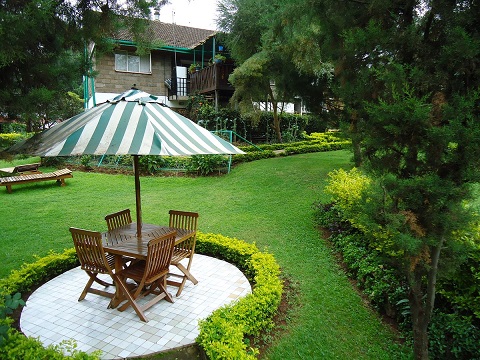
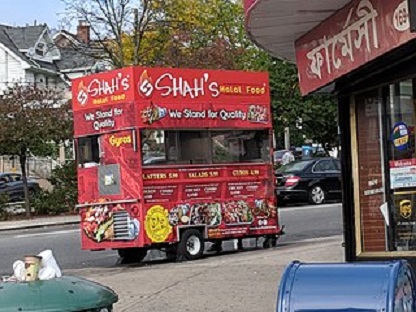
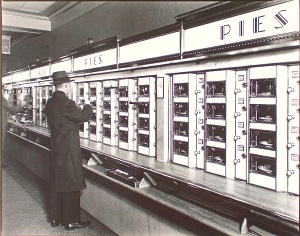 food
on your tray, you walked into the huge eating area which had dozens of little
tables with only two chairs per table. So, our family had to find empty chairs
at several tables, and the polite understanding is that if someone was alone at
a table, he had to let someone else sit in the other chair and eat with him. New
Yorkers, with rare exceptions, thrive on sharing space with one another, and I
was encouraged by an older gentleman to sit down and eat at his table. I got to
where I liked the friendly way of New Yorkers. I hope they are still that way.
The old man I sat with wanted to know all about my adventuresome parents who were
going to Africa.
food
on your tray, you walked into the huge eating area which had dozens of little
tables with only two chairs per table. So, our family had to find empty chairs
at several tables, and the polite understanding is that if someone was alone at
a table, he had to let someone else sit in the other chair and eat with him. New
Yorkers, with rare exceptions, thrive on sharing space with one another, and I
was encouraged by an older gentleman to sit down and eat at his table. I got to
where I liked the friendly way of New Yorkers. I hope they are still that way.
The old man I sat with wanted to know all about my adventuresome parents who were
going to Africa.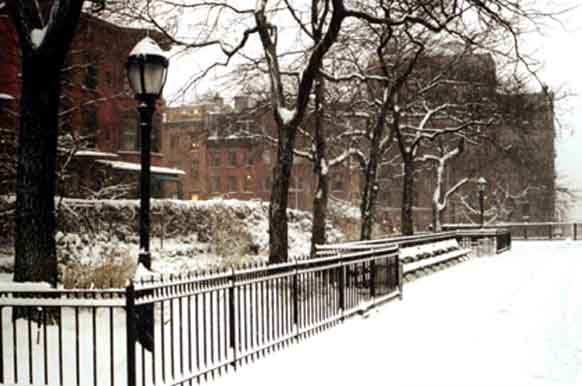
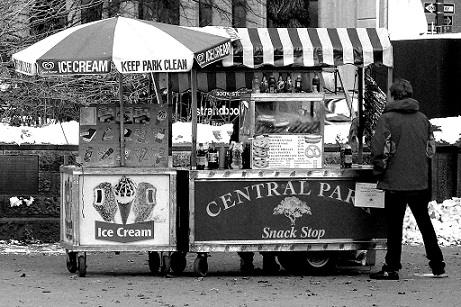 Food
culture in New York City
Food
culture in New York City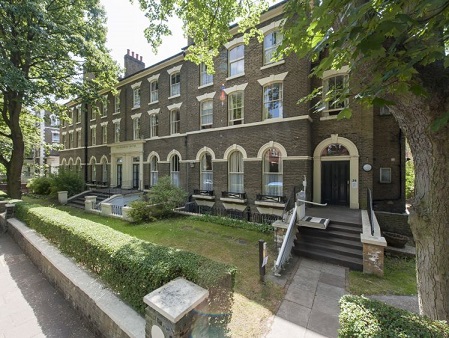 But,
to balance off the odd menu, there was a billiard table in the basement, and Dad
said I could play all I wanted. In my Dad's era, billiard tables were only found
in bars, so we were startled to find one in a missionary guest house. Every day,
a retied Anglican bishop sat in the bay window in the "sitting room,"
and he did nothing but read his Bible and devotional books. At the time I thought
he was not of much use to humanity just sitting there all day, but at 78 I can
now appreciate his flight from duty to find some rest for his soul. That guest
house has always made a serious effort to be an oasis for weary Christian workers.
But,
to balance off the odd menu, there was a billiard table in the basement, and Dad
said I could play all I wanted. In my Dad's era, billiard tables were only found
in bars, so we were startled to find one in a missionary guest house. Every day,
a retied Anglican bishop sat in the bay window in the "sitting room,"
and he did nothing but read his Bible and devotional books. At the time I thought
he was not of much use to humanity just sitting there all day, but at 78 I can
now appreciate his flight from duty to find some rest for his soul. That guest
house has always made a serious effort to be an oasis for weary Christian workers.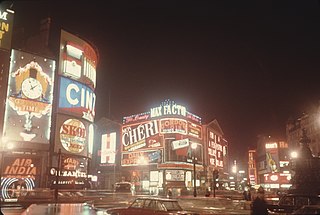
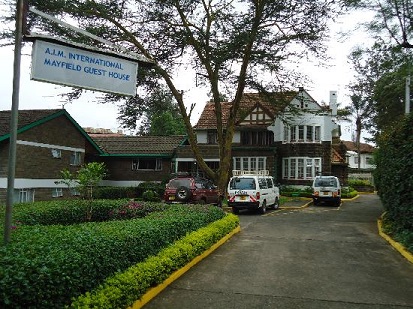 AFRICA
INLAND MISSION
AFRICA
INLAND MISSION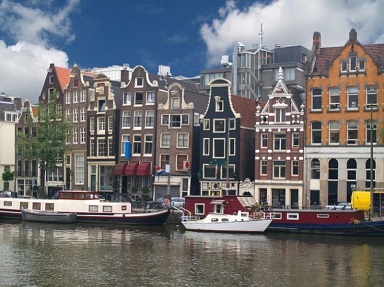
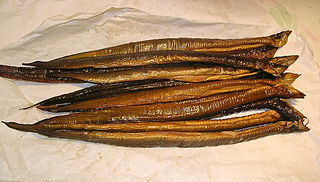 The
next day, we decided to take the local bus to Volendam. Do not take the tour bus.
The local bus is a lot slower, and you get to see life better. Volendam is a fishing
village, and there are boisterous Hollanders sorting the day's catch all along
the water front. They are decent to tourists, but they are also pranksters. One
of them dumped a bucket of fish parts over the side as I was watching, and the
splash nearly got all over me. I had no choice but to laugh along with the fishermen
who thought it was great fun to terrify the American tourist. At Volendam we bought
Paling, smoked eel, to take back to our room for lunch. It was quite good, but
the look of the eel was unnerving.
The
next day, we decided to take the local bus to Volendam. Do not take the tour bus.
The local bus is a lot slower, and you get to see life better. Volendam is a fishing
village, and there are boisterous Hollanders sorting the day's catch all along
the water front. They are decent to tourists, but they are also pranksters. One
of them dumped a bucket of fish parts over the side as I was watching, and the
splash nearly got all over me. I had no choice but to laugh along with the fishermen
who thought it was great fun to terrify the American tourist. At Volendam we bought
Paling, smoked eel, to take back to our room for lunch. It was quite good, but
the look of the eel was unnerving.